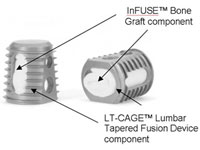
The battle over Medtronic’s (NYSE:MDT) Infuse bone-growth protein continues to be a roller-coaster, with judges in 2 states issuing seemingly conflicting rulings about the validity of patient injury lawsuits against the Minnesota medical device giant and its troubled Infuse bone-growth protein.
With the dismissal of 1 lawsuit while another is allowed to proceed, patients and medical device makers alike are looking for potential weaknesses in federal preemption laws, which have protected many medical device makers by effectively squashing liability lawsuits against products approved by the FDA.
A Minnesota judge this week evoked federal preemption laws to dismiss patient injury lawsuits against Medtronic and Infuse, leaving the door open, however, for patients to resubmit their lawsuits with more specific complaints.
The Minnesota ruling seems at odds with a decision handed down by an Illinois judge, who ruled that a similar lawsuit against Medtronic may proceed. Both lawsuits attempted to pin the blame for alleged patients injuries on Medtronic on the grounds that the company engaged in off-label marketing, the Star Tribune reported.
A decision in the ongoing Illinois lawsuit is expected this summer, and the outcome may have a ripple effect on the entire medical device industry, which has for a few years now relied on preemption to dodge potentially damaging litigation.
In 2008 the U.S. Supreme Court ruled that patients can’t sue medical device makers in state courts over products that went through the FDA’s most stringent review process, called pre-market approval. The decision has helped block lawsuits against many medtech companies, including some Infuse complaints, but the justices left open a loophole to allow state suits that allege a "parallel claim" that the company in question broke FDA regulations.
Lawyers representing patients with complaints against Medtronic in the ongoing Illinois lawsuit may stake their arguments on allegations the the medical device company illegally marketed the Infuse product for uses that were not explicitly cleared by the FDA. Prior lawsuits have accused Medtronic of illegally marketing Infuse for use in the neck, but a years-long criminal and civil investigation closed in May 2012 without finding evidence of wrongdoing.
Minnesota lawyers Lou Bograd and Stuart Goldenberg of the Center for Constitutional Litigation are representing the plaintiff in the lawsuit before Illinois Judge Laurie Miller, as well as 35 other Infuse patient injury complaints. Thus far decisions in lower courts and gone both ways, and the case is likely to land Medtronic back in the Supreme Court.
The controversy over the Infuse product, which recently included a shareholder lawsuit accusing Medtronic and its leadership of misleading investors, blew up over the summer of 2011 when the Spine Journal dedicated its entire June issue (PDF) to exposing problems with growth proteins, including a repudiation of some of the research surrounding Infuse.
The journal’s investigation concluded that 13 studies (published by authors who collectively received millions from Medtronic) downplayed or omitted entirely evidence of safety risks from Infuse. The actual rate of "frequent and occasionally catastrophic complications" associated with the product was between "10% to 50% depending on approach."
The ensuing clamor spurred federal investigations into allegations that Medtronic’s paid consultants may have concealed Infuse’s risks. In the fall of 2012 a U.S. Senate report blasted Medtronic over its handling of the Infuse product, saying the company deliberately obscured evidence of adverse events and promoted off-label use of the product and paid out millions to the doctors who co-wrote positive studies, charges that the company "vigorously" denied.

